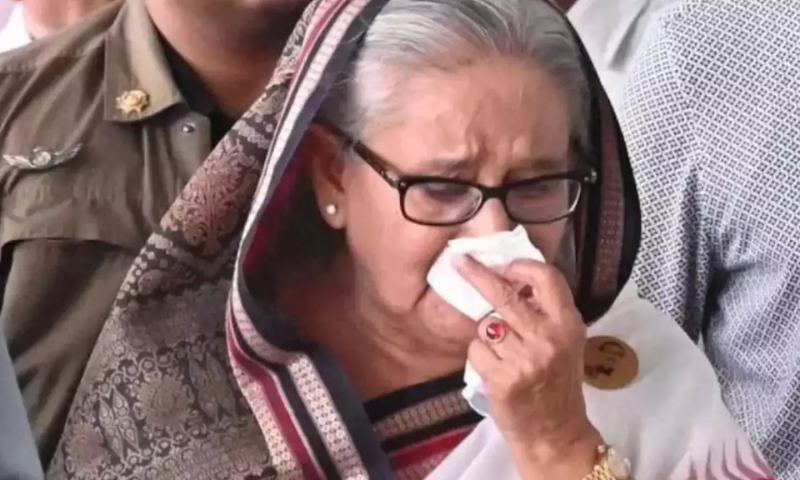In a dramatic twist of events former Prime Minister Hasina Wajid is going to be trialed for mass murders in Bangladesh. Countrywide protests which compelled Hasina Wajid to resign were unfortunately remained very violent and loss of precious lives was alarmingly high.
According to a report released by UNO, more than 600 hundred Bangali citizens were killed due to excessive use of force by the security forces. Opposition specially the protesting students and the families of the victims are accusing Hasina Wajid regime for the mass murders committed in broad day light on the weak plea of internal security. Interim government of Bangladesh has announced to run three mass murder trials against former Prime Minister Hasina Wajid.
A famous saying “Taste of his(her) own medicine” fits precisely to this surprising development. Hasina Wajid will be trialed in the same notorious ‘International Crimes Tribunal’ which was formed by her to investigate the 1971 war crimes in 2010. These tribunals were actually used to eliminate the political rivals of Hasina Wajid using fabricated charges and unauthentic evidences. Hasina Wajid and her party Awami League managed to eliminate more than 100 political opponents with merciless execution of controversial death sentences. Unfairness of these controversial trials was widely criticized by international human rights watchdogs and judicial organizations. Hasina’s resign was nothing short of kneeling before the protesting students.
Her quick departure to a border town of India Agartala is being viewed as a strong endorsement of Pro-India leaning of Awami League. Hasina wajid’s recent rule on Bangladesh was stretched over 15 years. During this long period Hasina Wajid triggered major controversies with undemocratic style of governance. Though, Bangladesh witnessed a significant phase of economic progress during first two terms of Awami League, however, blatant human rights violations eventually led to the unpleasant winding up of tyrant rule. Awami League focused more on reviving the spirit of liberation war and kept sowing the seeds of hatred against all political opponents.
Critiques of Hasina Wajid believe that Bangladesh gradually went under strong Indian influence during Awami League’s government. Outer layer of bilateral warmth was beneath the surface looked like a sort of Bangladesh’s absolute submission to the strategic regional designs of India. Awami League inherited strong Indian influence from its founding leader Shaikh Mujib who artfully pitched Bangali nationalism against West Pakistan’s dominance to erase the commitment of East Pakistan with two nation theory.
This recipe of ideological deviation enabled India to settle the score of 1947 partition with Pakistan. Shaikh Mujib and his Awami League made significant efforts to convert Bangladesh in a secular republic. For this purpose, ban was imposed on Islamic religious political parties. Politicized hatred against West Pakistan was exploited to terminate the deep Islamic roots from Bangladeshi society. This recipe proved successful during the thundering liberation war storm in 1971. Mujib successfully attained India sponsored version of liberation. He was titled Bangla Bandhu and granted the founding father status in modern Bangladesh.
Unfortunately, Awami League’s version of liberation proved a nightmare and in a short span of four years Bangla Bandhu was assassinated by a group of rebellious army officers. Liberation dream was shattered and country went under military rule. Saner quarters realized that political disputes and geographical handicaps were exploited by India through Mujib to isolate the East and West Pakistan. Later on, Islamic parties and religious minded Muslim circles objected upon the national anthem which was written by famous Hindu literary figure Rabinder Nath Tagore. During military rule of late General Zia-ur- Rehman an effort was made to change the national anthem. During 1988, Bangladesh took a visible refuge from Mujib’s secular vision and adopted Islam as official religion. A large part of Bangali masses is still connected with that ideology which compelled Bangladesh to seek separation from British India on the basis of Muslim identity.

Hasina Wajid, being political heir of Mujib’s ideology, continued to cement the toxic pro-India policies. Her vigorous pursuit of unwise objectives was disliked by those segments of society who were susceptible to growing Indian dominance on Bangladesh. Hasina’s resign is the beginning of end of Indian influence in Bangladesh. Awami League’s close linkage with Modi led BJP is another factor which played against the already tainted image of Hasina Wajid.
Hindu rightwing quarters in India have started threatening Bangladesh for alleged marginalization of Bangali Hindus. It is a unique revival of two nation theory which is emerging with the growing tensions between Muslim dominated Bangali Nationalism and BJP led Hindu Nationalism. It is also writing on the wall that Hasina like her firebrand father will be remembered in the pages of history as an Indian influenced tyrant ruler.























